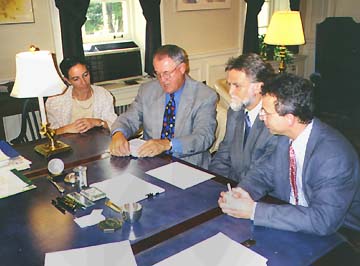
As community associations have evolved over the years, one thing has become evident -- smaller associations do not have the same opportunities to attract professional management services as do larger associations. The reason for this is simple economics - it is less profitable for a professional management firm to provide service to a smaller association.
When a community engages the services of a professional management firm, the "set up" costs are approximately the same, regardless of the size of the association. Beyond that, many service requirements are not reduced simply because there are fewer units. Those requirements include attending board meetings, managing bid projects, and preparing reports and recommendations to the Board of Directors. The same monthly financial statement and many other financial functions are also required. Finally, smaller associations typically do not have site staff to support the management process, which increases the demands on a manager and management firm.
As a result, to make a good business decision, some management firms often evaluate the financial value of a potential client. For example, if a 300 unit, staffed community pays $15 per unit, per month, the value of the annual fee is $54,000. If the same community, which may or may not be staffed, had only 89 units, the annual management fee is only $16,020. Even if the fee is doubled to $30 per unit/per month, the annual income of $32,040 is still significantly less than the 300 unit community at half the per unit/per month cost.
Another challenge facing smaller communities is the fact that the community management business cannot always determine the time that will be needed to provide its services. For example, a management firm cannot predetermine how many homeowner calls it will need to respond to in any given day, how many emergency calls will be made after hours, how many contractor follow-up calls will be needed for a bidding process, or how many board or committee members may request information within a given day. All of this equates to time necessary to do the job and its corresponding profitability or lack thereof.
Small or Large Management Firm?
It is easier for a larger firm with multiple options and staffing to offset the unknowns than for a small firm. In the face of all of this, the smaller community association must work with the professional management firms available to them -- which tend to be smaller firms. Because their profit margin is much lower, small firms must substitute the volume of communities for the volume of units to be profitable. A portfolio manager must therefore compensate by carrying many more communities which, in turn, can limit his or her availability to a single community.
Smaller firms generally have less staffing to provide for manager assistance or operational continuity - such as assistant managers, customer service representatives, and back-up bookkeepers and accountants. Beyond that, small firms can rarely afford to develop the resources that make their operations efficient ~ such as state-of-the-art computerization, professional training for managers, and the like. In fact, the expectations and standards that have been established for management companies may not be realistic for companies that service small associations. While trade associations and other industry professionals lament the problem, they too often fail to make the distinction that the simple economics ~ and practical application ~ show that services cannot be provided to small communities at the same level provided to larger associations, unless the price is significantly increased. Obviously, this poses a problem for the small community with fewer units to support its budget and services.
Consequently, smaller associations often find themselves in the position of having limited management options and services they often do not find to be satisfactory.
What can a small association do to improve the inherent problem?

Outlined below are ideas that can help a small association attract a professional management firm and get dependable services at a reasonable price.
- A recognition and understanding of the challenge is essential to improving a small community's position to attract a quality management firm.
- The small association can play an active supplementary role for day-to-day management tasks.
- If there is no on-site staff, board members could work with the community manager and share some of the site responsibilities (e.g. project management).
- If the community manager can develop specifications for projects, conduct the bidding process, award the contracts, and start the project to identify that proper materials are being used, the board member assigned to "facilities" or "project management" can review the daily work. This can reduce the time required of the community manager. This same principle can be applied to other requirements, such as identifying street lights that are burned out, determining whether improperly tagged cars continue to park on association property, whether a covenant or architectural violation has been cured or continuing, whether the trash company is leaving debris or picking up as scheduled, whether the landscape company is blowing grass off the sidewalks, etc.
- A small association should make an effort to run the board and community like a business. How often do members of the board and/or committees call the manager to "talk" and how long do these calls last? The same applies to e-mail. Stick to the basics and be efficient with time and resources.
- Be prepared for board meetings. Read the board package in advance and be ready to share input and to make a decision. Do not take the time to repeat and reiterate what other board/committee members have already said. Hold meetings to one productive hour, whenever possible.
- Consider scheduling the monthly board meetings during the business day instead of later in the evening.
- Consider if quarterly, rather than monthly, meetings would be sufficient.
- Have the business portion of the meeting first in order to make necessary decisions and deal with the manager's issues. General community discussion with other board members and homeowners can be held after the business meeting.
- Can members of the board prepare some of the management package, such as the agenda, meeting minutes, issues unrelated to the management report and/or specs and bidding projects?
- Can a member of the board be responsible for emergency calls?
- Agree upfront with what the reporting requirements are and stick to them.
- Agree on the expectations between management and the board and stick to them.
Smaller associations often need the services of professional management as much as large associations. By taking some of the steps mentioned above, smaller associations will have the benefit of reliable management services by being able to attract the best firms available. Boards of directors and owners deserve high quality management services and should not be handicapped simply because of the size of the association or its available budget for such services.
 Print
Print Email
Email







